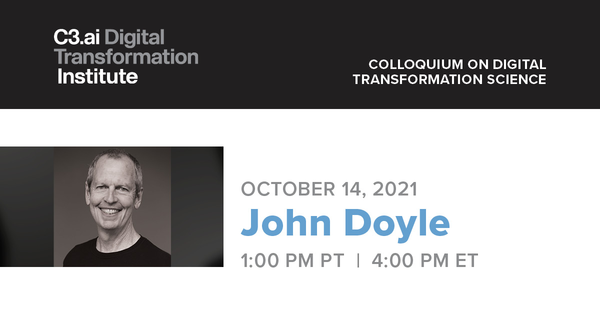
- Sponsor
- C3.ai Digital Transformation Institute
- Speaker
- John Doyle
- Registration
- Required.
- Views
- 31
- Originating Calendar
- NCSA-related events
The past year, unfortunately, highlighted intrinsic and systemic unsustainability and fragilities in our society and technologies. While detailed mechanisms underlying “systemic fragilities” in immune, medical, computing, social, legal, energy, and transportation systems are incredibly diverse, all are enabled by shared universal features of their architectures, which are largely ad hoc historical artifacts. AI has many well-known fragilities, but outside social media has not so far contributed substantially to the catastrophes unfolding in these systems. This is poised to change dramatically. We need to more systematically design architectures that produce more robust and sustainable systems, including allowing higher-layer learning and lower-layer efficiencies to contribute. I’ll sketch the basic concepts of laws, layers, levels, speed-efficiency-accuracy-flexibility tradeoffs (SEAFTs), diversity-enable sweet spots (DeSS), how crucial hardware layer constraints on sparsity, locality, and delay limit system layer functionality, and how proper layering can mitigate this via DeSS. Examples include all our tech nets, layered brains (e.g., throwing and hitting 100 mph fastballs), layered immunity augmented by medicine and policy (and insights into the current pandemic), systemic legal fragilities and the 14th amendment, cascading failures in energy, climate change, language and its hijacking in social media, encouraging animal models for social architectures, and wildfire ecosystems.
John Doyle, Jean-Lou Chameau Professor of Control and Dynamical Systems, Electrical Engineering, and BioEngineering, California Institute of Technology. He earned his BS and MS degrees in electrical engineering from MIT. He received his doctorate in mathematics from the University of California, Berkeley. His research interests are in integrated theory foundations and architectures for complex networks that enable efficiency and robustness, with applications to tech, bio, neuro, and social systems and an emphasis on the impact on control performance due to delays, sparsity, locality, and saturations in sensors, actuators, communications, and computing components, and how these arise in and challenge bio, neuro, tech, and social system design. He has few academic awards but when younger had many regional, national, and world records and championships in various sports, and he is known for fantastic students and colleagues.